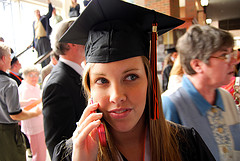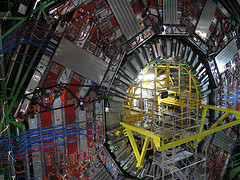helping you to navigate SciEng information
November 5th, 2008 by Eugene Barsky | No Comments »

Now after the election, it would be interesting to see whether Senator Obama will perform on the science and technology issues his campaign has promised.
Here is Obama’s platform on STM issues, accumulated by the American Association for the Advancement of Science – http://election2008.aaas.org/comparisons/obama.shtml
Do you notice something of a particular interest to you?
** Photo by jmtimages
Posted in Atmospheric Science, Chemical and Biological Engineering, Chemistry, Civil Engineering, Earth and Ocean Sciences, General Science, Geography, Main, Materials Engineering, Mathematics, Mechanical Engineering, News, Physics, Science - undegraduate classes, Statistics, Wood Sciences | No Comments »
October 31st, 2008 by Kevin Lindstrom | No Comments »
Scifinder Scholar Web is a newly developed web interface that provides online access to Chemical Abstracts, CASREACT chemical reactions database, Chemical Abstracts Registry File, and Medline.
This new version of Scifinder does not require the installation of any additional client software.
For more information on how to access Scifinder Scholar Web
Posted by Kevin Lindstrom Liaison Librarian for Chemistry, Chemical and Biological Engineering, Materials Engineering, Electrical and Computer Engineering, and Earth and Ocean Sciences.
Posted in Atmospheric Science, Chemical and Biological Engineering, Chemistry, Civil Engineering, Earth and Ocean Sciences, General Science, Main, Materials Engineering, Mechanical Engineering, Physics, Science - undegraduate classes, Wood Sciences | No Comments »
October 24th, 2008 by Kevin Lindstrom | No Comments »
TRIUMF and UBC’s Department of Physics and Astronomy are proud to present the 2008-09 Saturday morning lecture series on Quantum Physics and Chemistry. We especially welcome guest speakers from the UBC Chemistry Department and from Simon Fraser University to this year’s program. This lecture series will introduce the audience to the essential facts about the quantum world in a systematic and non-technical way, starting with the basics and progressing to more advanced material, at a level appropriate for high school students and members of the general public. It would be excellent enrichment for high school chemistry and physics students. There is no charge for admittance, and students are encouraged to bring friends and interested family members. Teachers and members of the public are also welcome.
Due to the popularity of the series, advance registration is required.
October 25, 2008
10am – 12pm
Prelude to quantum Mechanics: Classical wave motion – Patrick Bruskiewich
Sound waves and the physics of music – Chris Waltham
November 29, 2008
10am – 12pm
Failures of classical physics and the birth of quantum physics – Mark Van Raamsdonk
Lasers and their applications – Kirk Madison
January 17, 2009
10am – 12pm
Quantum physics II – Mark Van Raamsdonk
Quantum computers – Robert Rausendorf
February 14, 2009
10am – 12pm
Quantum chemistry: molecules and chemical bonds – Roman Krems
Quantum chemistry on a computer – Y. Alex Wang
March 28, 2009
10am – 12pm
Quantum tunneling – Patrick Bruskiewich
Quantum weirdness – Bill Unruh
April 18, 2009
10am – 12pm
Quantum mechanics and materials science – Jeff Sonier
Quantum mechanics and subatomic physics – Stanley Yen
Posted in Chemical and Biological Engineering, Chemistry, Earth and Ocean Sciences, General Science, Main, Materials Engineering, Mathematics, News, Physics, Science - undegraduate classes, Statistics | No Comments »
October 15th, 2008 by Eugene Barsky | No Comments »

A technology report (PDF) by a Harvard University student shows that of all the digital tools that professors use, Harvard students find most useful online course material and syllabi.
The report said students want courses to have a Web site that contains readings, notes and other content so they can be accessed easily during the semester. The survey is based on responses last December from 328 undergraduates and 120 graduate students.
Is it the same with our UBC folks? Does it ring any bells for our faculty?
** Photo by AdamLogan
Posted in Atmospheric Science, Chemical and Biological Engineering, Chemistry, Civil Engineering, Earth and Ocean Sciences, General Science, Geography, Main, Materials Engineering, Mathematics, Mechanical Engineering, News, Physics, Science - undegraduate classes, Statistics, Wood Sciences | No Comments »
October 8th, 2008 by Eugene Barsky | No Comments »

Released in June 2008 by Thomson Reuters (formerly ISI), this list shows the top ten nations ranked according to output of published journal articles in 22 main fields of science (including general social sciences), based on papers indexed by Thomson Reuters (excluding books, book chapters, and articles published in non-Thomson Reuters-indexed journals) between January 1998 and February 29, 2008.
http://sciencewatch.com/dr/sci/08/jun15-08_1/
** photo by 427
Posted in Atmospheric Science, Chemical and Biological Engineering, Chemistry, Civil Engineering, Earth and Ocean Sciences, General Science, Geography, Main, Materials Engineering, Mathematics, Mechanical Engineering, News, Physics, Science - undegraduate classes, Statistics, Wood Sciences | No Comments »
October 6th, 2008 by Kevin Lindstrom | No Comments »
The 262 new submissions received between Wednesday 1 Oct and Thursday 2 Oct, announced Friday 3 Oct 2008, brought the total number of articles on arXiv past 500,000 — all openly accessible.
There are also more than 200,000 old versions of articles which record all public revisions since 1997. If the linear increase in submission rate continues, arXiv will pass the one million article mark in 2015.
See press release for more details.
Submitted by Kevin Lindstrom Liaison Librarian for Physics and Astronomy
Posted in Chemistry, Earth and Ocean Sciences, General Science, Main, Mathematics, News, Physics, Science - undegraduate classes, Statistics | No Comments »
October 2nd, 2008 by Kevin Lindstrom | No Comments »
The International Year of Astronomy 2009 is a global effort initiated by the International Astronomical Union and UNESCO to help the citizens of the world rediscover their place in the Universe through the day- and night-time sky, and thereby engage a personal sense of wonder and discovery.
Check out the IYA2009 website for information about the initiative as well as additional resources and information on global IYA-sponsored projects.
Interested in Physics and Astronomy research here at UBC? Have a look at the Department of Physics Astronomy and Astrophysics website. Here you will find a full list of faculty and their areas of research.
Submitted by Kevin Lindstrom Liaison Librarian for Physics and Astronomy.
Posted in General Science, Main, News, Physics | No Comments »
September 12th, 2008 by Kevin Lindstrom | No Comments »
We’ve got ebooks on almost any topic under the sun and pdf’s are a lot lighter to carry than paper.
You want books on how to write code in Python or how to fix your new laptop running Microsoft Vista? Have a look at the Books 24X7 IT Collection.
Trying find some good stuff on biodiesel? Heres’ a hot title
Biodiesel – A Realistic Fuel Alternative for Diesel Engines
Need some physical property data like the viscosity of Cl2 gas? A search of Knovel.com will link you to the Chemical Properties Handbook and Yaws’ Handbook of Thermodynamic and Physical Properties of Chemical Compounds
Need some good information on climate change? Here’s a good starting point Assessing Climate Change.
Circuit diagrams for operational amplifiers? Check out the Electrical Engineering Handbook.
All in all, you have access to more than five thousand science and engineering ebooks.
For a complete list (not including Books24X7 titles) go to the Science & Engineering Ebook site. There you can find A-Z titles lists of ebooks as well as the search interfaces for the ebook collections you have access to. Make sure you look at the Springer Ebooks as well. Springer is a major science and engineering publisher.
Remember that these resources are not freely available on internet, so if you are connecting from off campus, go to UBC’s VPN site for instructions.
Posted by Kevin Lindstrom Liaison Librarian for Earth and Ocean Sciences, Chemistry and Chemical Engineering, Electrical and Computer Engineering, Materials Engineering, and Physics.
Posted in About this blog, Amusing stuff, Atmospheric Science, Chemical and Biological Engineering, Chemistry, Civil Engineering, Earth and Ocean Sciences, General Science, Geography, Main, Materials Engineering, Mathematics, Mechanical Engineering, News, Physics, Podcasts, Science - undegraduate classes, Statistics, Wood Sciences | No Comments »
September 10th, 2008 by Eugene Barsky | No Comments »

http://www.newscientist.com/article/dn14699
The article discusses the experiments, provides a video and the images from the Collider that started to operate TODAY!
** Photo by µµ
Posted in General Science, Main, Mechanical Engineering, News, Physics, Science - undegraduate classes | No Comments »
September 5th, 2008 by Kevin Lindstrom | No Comments »
Nothing like a juicy headline to catch your attention! From this week’s edition of Science
“The doom mongers do have one thing right: The LHC just might create black holes. According to Einstein’s theory of general relativity, energy warps space and time. So by smashing protons together with unprecedented vigor, the LHC might cram enough energy into a small enough volume to create pinholes in the universe–miniature black holes. If space has three dimensions, even the energies reached by the LHC will be about a million billion times too low. However, string theory–which assumes that every fundamental particle is in fact an infinitesimal vibrating string–predicts that space has more dimensions curled into tiny loops. If some of them are curled loosely enough, then the energy threshold may tumble to within the LHC’s reach, some theorists have argued.”
Also have a look at
LARGE HADRON COLLIDER: The Overture Begins
Science 321 (5894), 1287. [DOI: 10.1126/science.321.5894.1287]
LARGE HADRON COLLIDER: Researchers, Place Your Bets!
Science 321 (5894), 1288. [DOI: 10.1126/science.321.5894.1288]
LARGE HADRON COLLIDER: Bracing for a Maelstrom of Data, CERN Puts Its Faith in the Grid
Science 321 (5894), 1289. [DOI: 10.1126/science.321.5894.1289]
Submitted by Kevin Lindstrom@ubc.ca Physics Liaison Librarian
Posted in Amusing stuff, General Science, News, Physics | No Comments »
« Newer Posts - Older Posts »




